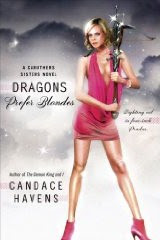So, I’ve found myself explaining to various wonderfully supportive friends and family types how the whole “refining my craft vs. selling out” crisis is going, over IM and email.
I figure I’ll write out the update here, then I can tell people just to go read my blog, which saves me typing the same stuff over and over, and has the bonus of irritating people, because I’ve found most people really hate being told to read my blog. It’s the techno version of “come over and see my slide show of my vacation and I’ll tell you about it then.” Beware of expressing idle interest in someone else’s obsession — you’ll regret it sooner or later.
For those listeners at home who may just be tuning in, I’ve been working this last week on trying to discern where the two different voices are in my novel, that this agent identified as conflicting with each other, to the detriment of the book. One is a more commercial voice and one more literary. Guess which has to go?
David, the love of my life, offered to have me read it aloud to him. This is a big favor, because he doesn’t really read fiction. I did once read the entire Ender/Speaker for the Dead series to him over a summer of road trips. Now that we have more comfortable incomes we usually fly places and have very few road trips.
So, I printed out the first couple of chapters, read them to him and he stopped me anytime he lost the thread of the story or thought it got vague. Which ended up being a lot. It’s a good thing he loves me because at one point when he stopped me, I snapped “What? I don’t get ANY description?!?”
But I marked all those sections and our relationship survived and was fully repaired over cocktail hour. It’s funny, because the agent told me that if I could make the fixes, she’d love to see it again, but that she also understood that this was the “hardest and most emotionally frustrating part of the process.” And she wished me luck. Turns out I needed it.
The next morning, I sat down to revise. And decided pretty quickly that David was an idiot who had no idea what he was talking about. All the stuff he picked out was really good stuff.
Just then, an email arrived from a contest I failed to final in, with comments from the judges. Now, I’ve pretty much stopped reading judge’s comments. I enter the contests for the opportunity to put my novel in front of editors and agents if I final. If I don’t final, most of the time it’s because at least one judge REALLY HATED my book. Like giving me a 50% score hated. Usually the other judge will give me a nearly perfect score. So between the two, I don’t get super-useful feedback. Just the love/hate thing.
But I decided to look at these comments, to see if any of theirs coincided with what David identified. These scores turned out to be unusual because all three judges ranked me highly, with just enough points taken off to keep me from finalling. And they ALL picked on the exact thing the agent pointed out. And their comments? Yes: exactly the sections David thought slowed the story.
Another writer friend told me she read her novel to her tattoo-artist boyfriend, who was not a reader, but spends his days talking to people. She says “I’d want to kick him when he’d stop me and say ‘what? wait? what?’ But he was invariably right.'”
There’s been discussion lately on the FFP loop, about finding someone to critique your work who understands your particular sub-genre. Several people have chimed in that their best critiquers don’t write anything remotely the same, but they know a good story.
I lost a page and a half in the revision of Chapter 1. I read it again to David and he didn’t stop me once. He was surprised when I stopped at the end of the chapter, he was so caught up in the story.
So, yes, it’s painful. But I see that I can do it now. One of the judges clearly also writes in first person and she warned me to watch out for “I wondered,” “I thought,” “I saw,” “I heard” and “I noticed,” as constructions that yank the reader out of deep POV (point of view). She means that it brings in the narrative voice and the reader loses the sense of being in the character’s head. She’s dead right. I’ve been searching for those phrases and they cluster in the “slow” sections. Alas.
I suppose it’s part of life, that you never stop discovering new flaws. As you get things polished and handled, new problems are revealed.
Guess I won’t run out of stuff to do!
